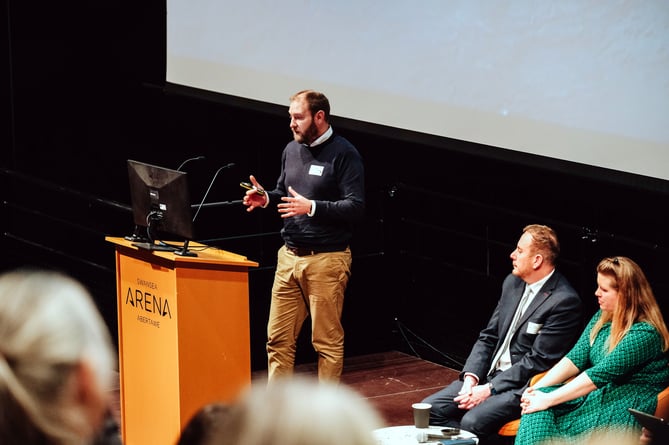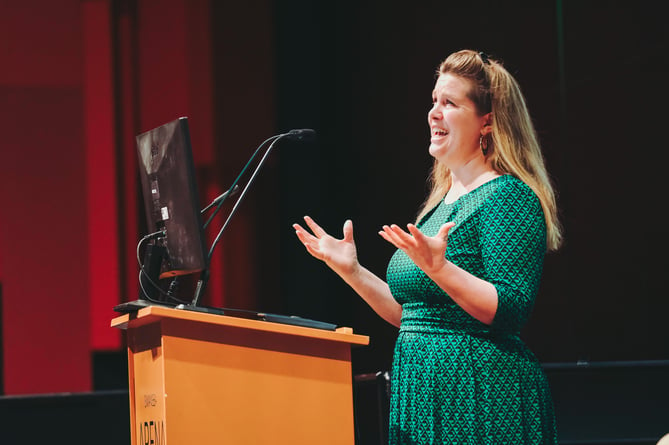Pembrokeshire Council Deputy Leader sets out green vision for the …
Pembrokeshire Council’s Deputy Leader has set out his green vision for the region at the first ever Green Economy Conference in Swansea.
Speaking in the opening session at the inaugural Green Economy Conference and Exhibition on November 22, Cllr Paul Miller, Deputy Leader and Cabinet Member for Place, the Region and Climate Change at Pembrokeshire County Council, highlighted the importance of the Milford Haven Waterway in helping to realise the vision of net zero industries in South Wales by 2040, delivering a 40 per cent reduction of current Welsh CO2 emissions.

Cllr Paul Miller at the Inaugural Green Economy Conference in Swansea (Pic supplied)
“If we get it right, it allows us to retain 130,000 jobs associated with industry in southwest Wales and unlock £30bn investment opportunities,” he said.
Also in the news
“The Crown Estate have set out their aspirations for floating offshore wind in the Celtic Seas, and they’re enormous. We need to get our region ready to harness the benefits of that opportunity and also to secure its delivery.
“It’s not just about floating offshore wind, it’s about what that green energy generation allows us to do onshore, and the additional opportunities that that presents. We are starting to talk about a potential hydrogen network across South West Wales: how can we create green hydrogen, use it to feed industry and southwest Wales, and use that as a product that decarbonises operations across the region?”
He said the possibilities spanned everything from producing green hydrogen for buses and transport, through to examining how to use green hydrogen in industrial processes.
He added that it is important to recognise that some carbon will always be produced by our existing industries, so it is important to look to the future of carbon shipping, capture and storage as well.
“Milford Haven Energy Kingdom is allowing us to do some of that,” he said, referring to a programme of work funded by UK Research and Innovation as part of their Industrial Strategy Challenge Fund, to explore the potential of zero carbon hydrogen alongside renewable electricity to meet future energy needs of buildings, power generation, and refuelling transport.
He also welcomed the major companies, including Norwegian Government owned Statkraft, which are investing in Pembrokeshire.
“We’re competing globally for investment, and the fact that they’re here is a good start,” he said. “We need to create the right conditions for them to want to invest in this region ahead of some of the other opportunities that their key decision makers will be considering.”
He added that the Celtic Freeport, due to be formally designated by the Welsh and UK Governments in spring/summer 2024, will be key to this.
“It is part of that preparing our region for the opportunity and placing us to win those investment decisions,” he said.
“What it does, we hope, is create the right investment conditions, and allow us to see some of the benefits retained locally, which will then allow us to invest further in some of the infrastructure that we know is needed to support that industrial revolution.
“It’s game changing on its own, but taken together with a series of interventions working with our regional partners, it has the potential to really transform the regional economy.”

Dawn Lyle speaking in the opening session (Pic supplied)
Over 1,500 people attended the inaugural Green Economy Conference and Exhibition at Swansea Arena on Wednesday, which set out to strengthen communication and collaboration to build a green economy in South West Wales. Themes addressed included green jobs, greener transport, and how to decarbonise existing businesses.
The conference included a session on the circular economy in the region. The discussion addressed how to make use of shared resources, creating networks to reduce, reuse and recycle materials across the region.
This was followed by a renewable energy panel discussion, featuring Abi Beck from RenewableUK Cymru, Tom Sawyer from Port of Milford Haven and Celtic Freeport, Andrew Hartson from ABP and Celtic Freeport, Kamal Rajput from Tata Steel, Joseph Kidd from Hiraeth Energy and Marine Energy Wales, and Arwyn Williams from Pembrokeshire College. The panel discussed why the Celtic Freeport will be transformational, and how to maximise the benefits of renewables projects for local communities and the regional economy.
Following the construction and buildings panel discussion, the final session explored how regional businesses can start (and continue) their journey of sustainability and what support and funding is available.
It is hoped to hold a conference again next year at Swansea Arena on Tuesday, November 19.